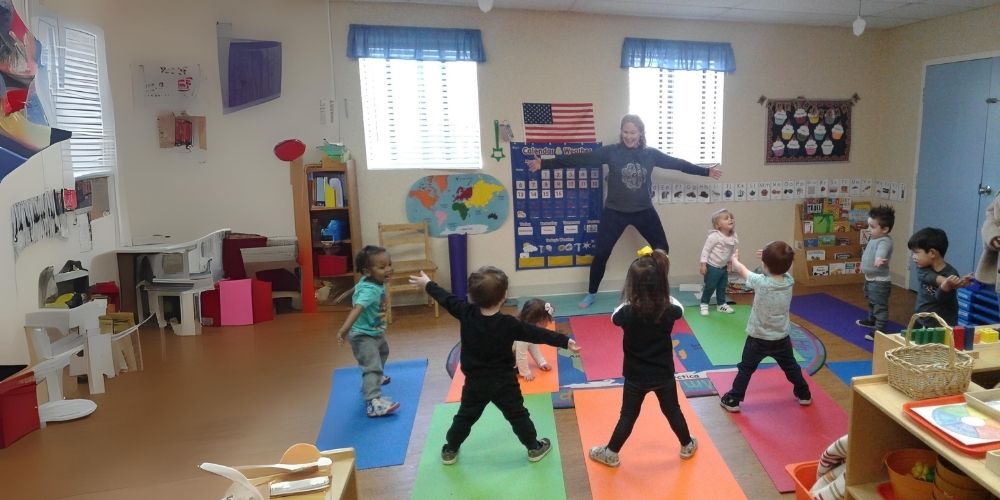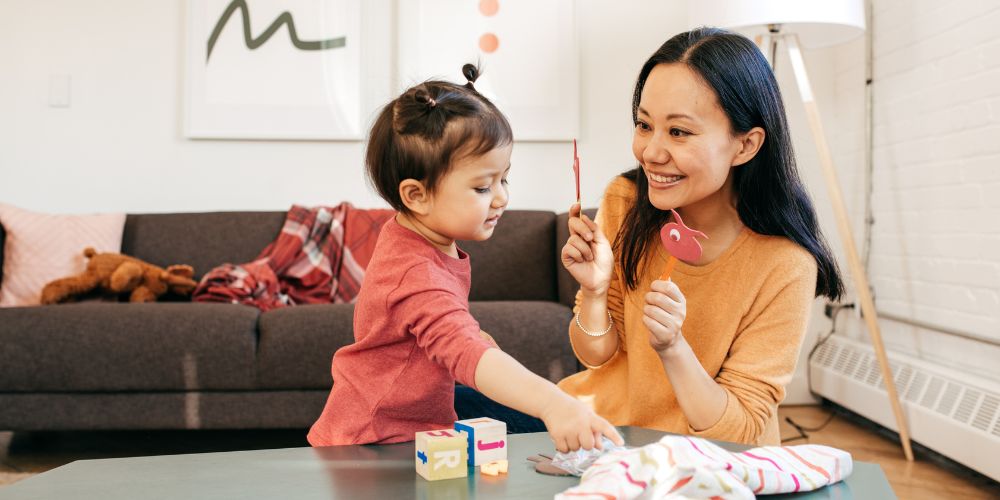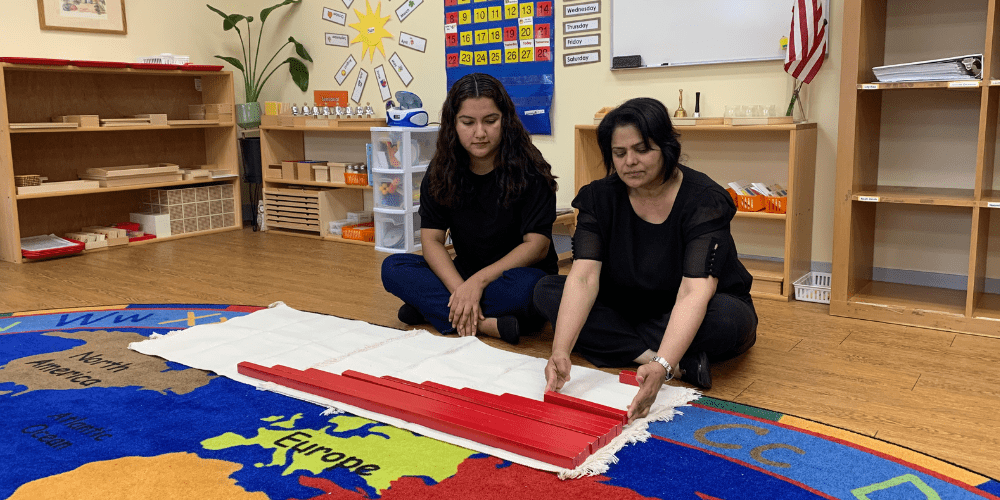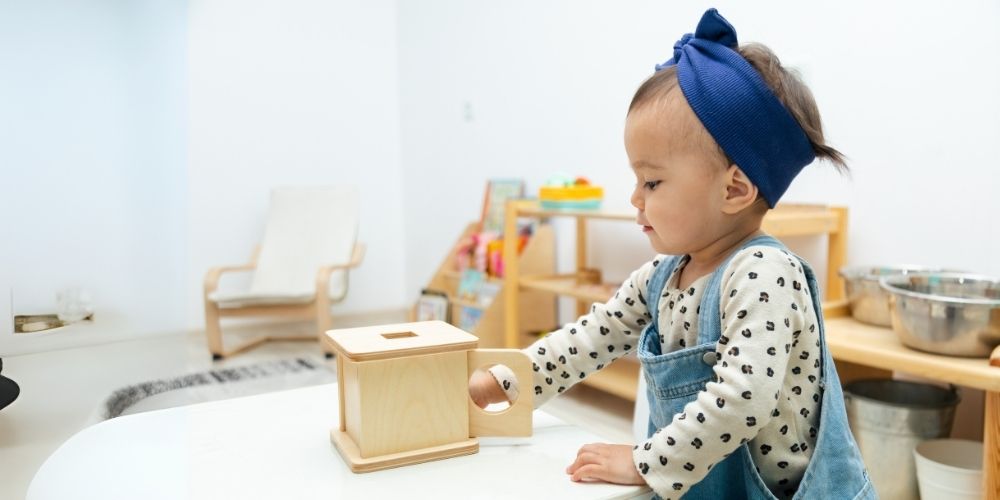Montessori Language: Building Communication and Respect from the Start
“If you consider the absorbent mind in relation to language, you will understand how necessary it is to put a small child among people who speak well and correctly, and who talk a great deal.”
— Dr Maria Montessori —
Language development in Montessori education is a foundational pillar that supports a young child’s growth into a confident and independent communicator. At Children’s Manor and Magnet Montessori Schools (CMMS), we believe that how we communicate with children sets the standard and tone for their relationships with others and with themselves throughout their lives.
Beginning in infancy, Montessori emphasizes creating a language-rich environment where children feel respected and encouraged to engage in meaningful conversations. Instead of simply talking ‘at’ children, Montessori teachers involve them in discussions, listen actively, and invite students to share their thoughts, feelings and questions.
How Montessori Nurtures Language and Communication Skills
One important aspect that sets CMMS apart from traditional daycare and preschool programs is our focus on fostering respectful communication in a safe, supportive setting. Our Montessori-trained teachers understand that every child arrives in the classroom with an innate capacity for language. Our goal isn’t just to teach individual words, but to help children build strong, clear, and respectful communication skills.
One of the first lessons in a Montessori classroom is naming: Children learn the names of their classmates, Montessori materials, and activities. Using precise language empowers children to express themselves clearly and builds confidence in their interactions and problem solving abilities.
In addition to vocabulary building, Montessori teachers model peaceful and polite communication daily. Teachers avoid calling across the room, use gentle tones, discuss problems openly, and maintain respectful distances to honor each child’s personal space. This intentional approach is woven throughout every part of the day, from lessons to transitions to quiet moments.
Montessori Language at Home: Talking Respectfully to Your Child
Purposeful communication doesn’t stop at school; it’s equally important at home. Families play a crucial role in reinforcing Montessori language development by modeling the communication style you want your child to learn. If you want your child to speak calmly, listen before responding, and express themselves thoughtfully, it’s essential to demonstrate these behaviors in your everyday interactions.
Here are some tips to remember to when practicing respectful communication with your child:
Look & Listen
- Observe first
- Try not to jump to conclusions. Observe what they are doing, saying, and feeling before responding. Consider the context, such as if your child is hungry, overtired, or excited.
- Listen to yourself as well as your child
- If you feel yourself getting frustrated or angry in response to a situation, take a deep breath before saying anything or responding with a tone you would not want them to mimic.
- Try not to immediately jump in to fix or problem-solve for them
- Focus on being present and supporting their thought process. Most of the time, children can figure things out and problem-solve on their own when given the space to do so.
Identify the Feelings
- Actively listen intently to your child as he or she talks
- Come down to their level, maintain eye contact and offer feedback while they are speaking so they know you are actively listening.
- Name and reflect on your child’s feelings
- “It seems like you’re feeling frustrated because your block tower fell. Is that right?”
- Resist asking and then answering questions that are rhetorical or accusatory – instead, note what you observe.
- “I see the trucks are all on the floor”
Engage Them in Cooperation
- Whenever possible, offer a choice
- This allows the child to feel a sense of independence while also maintaining boundaries (and also without giving them the opportunity to simply answer “no”!). For example, “I can see that you are disappointed that it is time to go upstairs for bed. Would you like to walk or would you like me to carry you?”
- Say it with information
- Use a word or short description, rather than a repetitive demand, ie “Books and Bedtime!” instead of “It’s time to go to bed”
Empathize with Your Child at Home
Here are some Montessori-inspired phrases you can try to express empathy and support healthy emotional development at home:
- “You seem [sad, grumpy, worried…]. What’s going on?”
- “You’re feeling [happy, guilty, annoyed…] because [event or situation].”
- “It sounds like you’re feeling [angry, hurt, embarrassed…] about [event or situation]. I understand how that feels.”
- “How [exciting, frustrating, disappointing…]!”
- “It bothers you that [event or situation].”
- “It’s hard for you when [event or situation].”
- “You wish [something were different]…”
Using these reflective phrases can help your child learn to name their feelings, understand their emotions, and feel more connected to you and to those around them. These small but powerful moments lay the foundation for strong communication skills and empathy, key values in a Montessori home environment and in life.
Encourage Intrinsic Motivation Over Praise
In Montessori, we focus on building intrinsic motivation rather than dependence on external praise. Children are encouraged to work on activities because they find them meaningful and satisfying, not for the praise of being told they did a “good job.”
While it’s natural to want to praise children, shifting from generic praise to specific feedback supports both their linguistic processing and internal growth. Instead of simply saying “Good job,” try these alternatives:
- “I bet you are proud you did it all by yourself!”
- “Tell me about this picture you drew. You used so many bright colors.”
- “I can see you worked hard on that puzzle.”
- “Thank you for helping clear the table.”
- “What did you enjoy most about your project?”
- “I noticed you helped your friend; that was kind of you.”
Learning to effectively communicate with your child is something that will require patience and continuous adaptation as they grow and develop. We encourage families to remember to follow the lead of the child whenever possible!
At CMMS, we work closely with families to ensure consistency between school and home. We offer resources and guidance to help parents reinforce Montessori communication techniques and build strong, respectful relationships.
If you’re looking for a nurturing, educational, and respectful environment for your child, we invite you to learn more about our programs. We offer Montessori-based infant care, preschool, kindergarten, and elementary programs designed to support each child’s growth and independence.
Schedule a tour today to see how CMMS can help your child become a compassionate friend and confident communicator!





